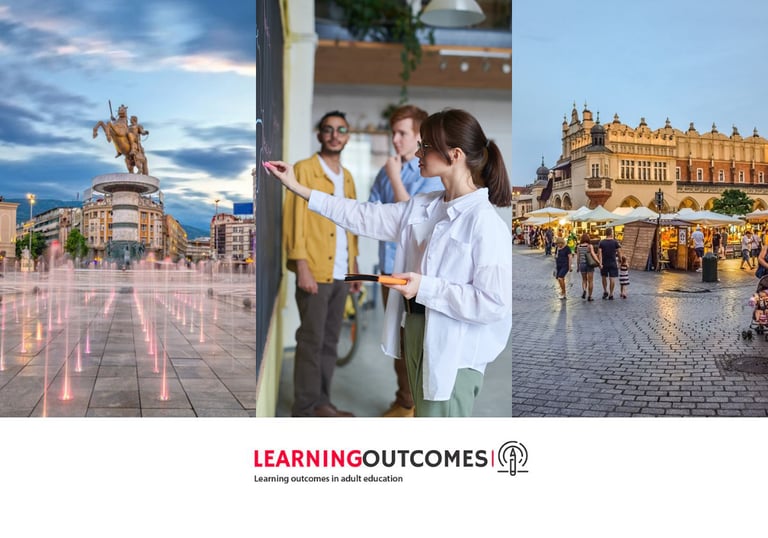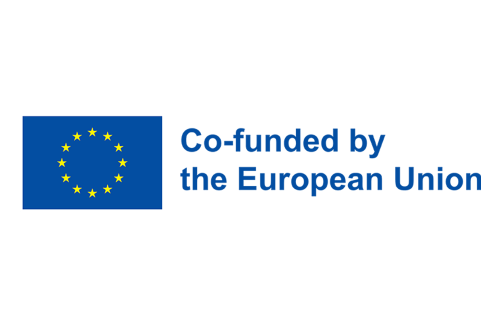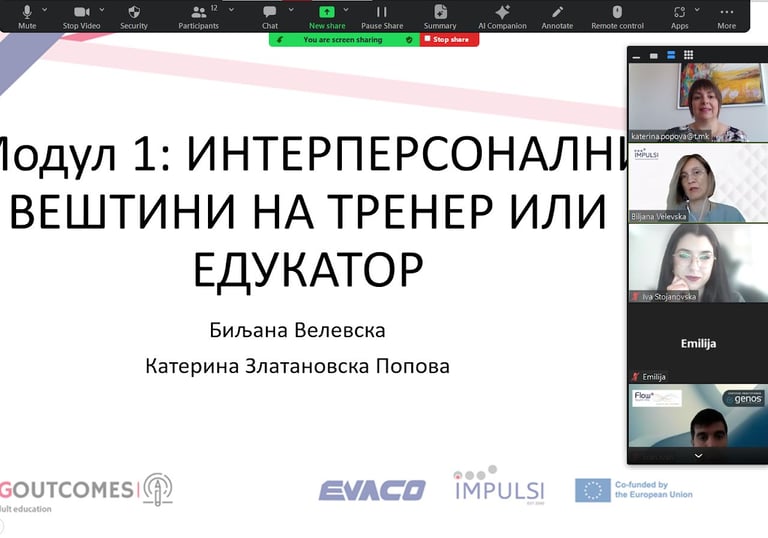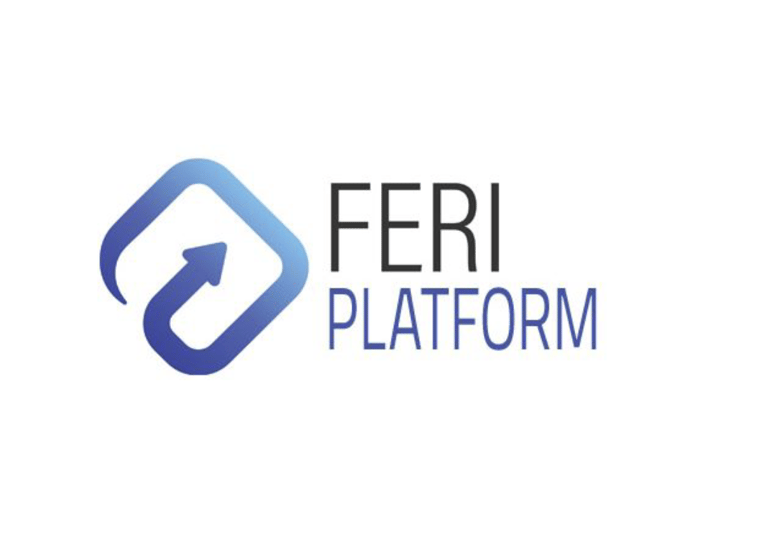Learning Outcomes in Adult Education
JULY! HERE WE COME! WE ARE STARTING OUR NEW ERASMUS PROJECT!
„LEARNING OUTCOMES IN ADULT EDUCATION”
Project number: 2022-2-PL01-KA210-ADU-000094502
Duration of the project: 01.07.2023-30.06.2024
Leader – EVACO, Poland
Partner – IMPULSI, Macedonia








Objective
The main objective of the project "Learning Outcomes in Adult Education" and thus the expected result is to DEVELOP THE KNOWLEDGE AND SKILLS OF PARTNERS IN THE FIELD OF CORRECTLY DEFINING LEARNING OUTCOMES AND METHODS OF THEIR VERIFICATION IN ADULT EDUCATION.
The project focuses on non-formal adult education.
The project objective will be achieved by:
Collecting information and good practices regarding the correct definition of learning outcomes and methods of their verification in adult education
Development and testing of training materials (hereinafter referred to as materials) on the correct definition of learning outcomes and methods of their verification in adult education. The project assumes activities related to the development of competences of educators in the adult learning sector. Thanks to the processes launched in the project, partner experts will have the opportunity to gather information and expand their knowledge, as well as skills in the field of the correct definition of learning outcomes and methods of their verification in adult education.
Additionally, the project results, being a collection of good practices and training materials, will constitute a permanent element allowing partners to develop competences of educators and assessors cooperating with them. They will also be used by other educational institutions.
Correct definition of learning outcomes and methods of their verification is one of the key elements of ensuring high quality of the educational offer. If we correctly and precisely define what a learner should know and how to perform tasks correctly, what attitude to have, we are able to properly plan the entire educational process.
This also guarantees us understanding in communication with the learner regarding expectations and expected effects. This is often a necessary condition for building motivation to participate in classes (what benefit/effect will I have after putting effort into the learning process).
Well-defined learning outcomes allow the learner to precisely determine, in interpersonal contacts, e.g. with an employer, what competencies they have.
Therefore, the results developed in the project will allow partners and cooperating educators/assessors as well as other educational institutions to acquire or expand knowledge and competences, and consequently IMPROVE ACCESS TO HIGH-QUALITY EDUCATIONAL OFFER for adults and IMPROVE QUALITY ASSURANCE of opportunities in the adult education sector.
KEY RESULTS:
One Report on Defining Learning Outcomes, Good Practices
Three multimedia training modules
One testing workshop
One design thinking workshop with the participation of international experts
Two webinars promoting
International Partner Meetings
These goals are closely related to the project issues. New methods and tools will be incorporated into the training program for educators by enabling the implementation of the developed results in Poland and other European countries.
The DIRECT TARGET GROUP will participate in the project activities and use the materials developed during the project. It includes partners (experts, educators and assessors participating in the project and working/collaborating with partners) within the project:
Project Tasks
Task 1
Gathering information and European good practices in defining learning outcomes and methods of their verification in adult education.
The entire task will involve the following stages:
Stage 1: Expert Meeting - detailed determination of stages, outlining work and directions of team activities.
Stage 2: It will involve the analysis of desk research in partner countries.
Stage 3: Gathering good practices from the European market.
Stage 4: Design thinking workshops (methodological) with international subject-matter experts on defining learning outcomes and methodologies. This will allow for an understanding of verification methods in adult education and existing systems of definition, ultimately leading to the development of a training program for educators. The workshops will be conducted online.
Stage 5: Collaborative development of a universal report summarizing the acquired knowledge and good practices, describing the ways of defining adult learning outcomes and methods of their verification.
Stage 6: Preparation of recommendations for the development of training programs for educators in the field.
Task 2
Preparation and Testing of Training Materials
The entire activity includes various actions such as:
• Closed thematic meetings with experts
• Webinars and internal training sessions
• Working groups
• Collaboration on the creation of materials, infographics, and thematic analyses by partners
• Participation in new initiatives
• Joint efforts to promote the idea of defining learning outcomes for adult learners
• Mutual learning and the development of innovative solutions
Educational materials will consist of at least 3 modules:
• The importance of proper definition of learning outcomes and methods of validation for learners, educators, experts, assessors, and stakeholders (module prepared by the leader).
• Proper definition of learning outcomes (module prepared by the partner).
• Proper determination of validation methods (module prepared by the leader).
Each module will consist of at least:
• Self-assessment of participants' existing knowledge and skills.
• Module scenario for educators (including the definition of learning outcomes).
• Multimedia presentation.
• Three podcasts.
• Four quizzes.
• Ten exercises.
• Verification process scenario.
In addition to the developed training materials, the following are among the results:
• Dissemination of educational materials through 3 webinars – each scenario will be presented as a webinar (open online meeting for interested participants, with a minimum of 10 people per group). Educators, tutors, NGOs, and training organizations will be invited, allowing for substantive and methodological evaluation of the proposed solutions.
• Promotion of project products online.
Important Links
Learning Outcomes Webinar
On May 23rd, a webinar was held as part of the Erasmus+ project: Learning Outcomes in Adult Education
New professions and competences in adult education
Adult education is currently undergoing a transformation under the influence of global megatrends, which have a huge impact on the situation in the labor market, the needs of employers and people seeking employment and wanting to expand their professional qualifications.
Read More on the topic "Learning Outcomes in Adult Education"
FERI Platform
Articles
According to the Macedonian law on adult education, The Centre for Adult Education is the institution responsible for official verification of programs in non-formal education.
The programs for adult education are developed based on detected real needs of the employers e.g. labor market demand.
Case study 1
Samerimpeks Impulsi following the labor market trends on the supply side and specifically the characteristics and expectations of Generation Z, on the one hand, and working with different size companies from different industries around the country detected the need for specialists for induction, onboarding, and development of employees. Based on the need the team of experts developed a special program for adult education: SKILLS FOR INDUCTION AND EMPLOYEE DEVELOPMENT.
The main objective of the Skills for Induction and Employee Development program is to gain specific knowledge, skills, and competencies applicable in every company and the departments of human resource management, organizational development, and staff development.
The program was designed to provide a relevant response to the increased labor needs of organizations for a specialized job position that will have a direct impact on the development of human resources. It consists of 4, interdependent and logically connected modules that contain a theoretical and a practical part. Both are prerequisites for a participant to gain the certificate.
During the program implementation, the following lessons came up as evident:
The project had an overall positive impact on the participating companies. First, the program was adapted to the specific needs and questions of each company, in terms of focusing on the positions the company saw as most relevant to be considered through the mentoring sessions.
The concept of mentorship and coaching is still very new to the domestic, specifically middle-sized companies. Most of them expected the trainers/consultants to provide ready-made documents and professional advice, while the program is focused on developing internal capacities so that the companies can continue to perform similar activities by themselves. Extra effort is given by the trainers/consultants to change this attitude of ready-made products.
The companies that seem to be advanced in this respect are companies from the IT Sector that are severely facing the challenges of recruiting and retaining employees. They tend to have documentation developed but lack skills for proper induction and mentoring of new employees. The biggest challenge is Generation Z and the clash of cross-generation attitudes.
Companies that do not have a dedicated/assigned HR person in their team found it more difficult to allocate time for developing the internal documents and providing sustainability of the program activities after the project. Organizing the meetings and sessions was also often challenging on several occasions when communicating with the top management participants. Implementation of any program activities depends on the commitment of the top management.
The project pioneered the latest trends in HR management and companies expressed the great value they have gained through the project activities. Most of the participants could not see the link between the company's vision, mission, and values with the job descriptions and mentoring programs for new and existing employees. During the project, this was one of the biggest highlights and wow effects.
The certificates are important to the participants but seem not to be so important to the companies. For the company management, the gained skills are most important and valuable. In some of the companies, the owners became aware of the HR function and the impact on the company results. That is a big achievement.
Based on the above-presented information, it can be concluded that the program had a significant positive impact on the participating companies. In many ways, the combined activities of training, mentoring, and coaching activities were perceived as a new approach that develops the internal capacities of the companies, rather than offering only ready-made consultant support. This ensures sustainability and continued implementation of the HR practices and overall higher impact and is a motivation to continue the mission of supporting the business growth through people development.
Case study 2
The company Uniplast from Struga, a small city on the Ohrid Lake is a specific case. Company UNIPLAST was established in 1986 as a factory producing and developing GRP (Glass Reinforced Plastic) Products, mainly exported to the automotive industry.
Since the business operations are unique, there is no formal qualification for Laminating Polyester. A vocational Education Degree in Chemistry is a good starting point but the skills of applying artificial fibers using resin do not exist.
Considering the conditions of the labor market and the growing trend of immigration from all over Macedonia, including the Ohrid-Struga region, the biggest challenge of the company became recruiting staff who want to work in the industry and educate them for the specific operations in production.
The company decided to develop a program for Qualification for Laminating Workers internally. The team of experienced managers and laminating workers developed a program and registered it with the Center for Adult Education. The most important component of the program is the program objective and the Learning Outcomes. The goal of the program is for candidates to acquire knowledge and skills to make final products from reinforced polyester for different purposes (such as boats, tanks, planters, manholes, slides, etc.), as well as repair damaged products from reinforced polyester. The learning outcomes are specific and clear for students and educators. The program was designed to educate students on the whole production process, acquaint them with the mutual interconnectivity of the operations, and develop team spirit.
According to the company owners, it was important to have workers trained on the job and adopt the company culture of unity, mutual care, customer care, and teamwork.
The duration of the program was three months with rotations of students on different operations to be learned. The internal commission decides who is qualified at the end of the program for which specific operation and gets immediate employment.
The program was additionally registered with the Employment Agency and gave financial support for the trainees for a minimum group of 68 people, of which 50% were supposed to be employed after that training. The responsibility for the successful delivery of the qualification was extremely high for the company. So dedicated internal trainers were additionally paid for each employed student that will stay with the company and be productive at the list for 6 months.
The concept showed to be successful with careful selection of students even if the labour market conditions were not in favour of the employer, as well as with clear and specifically defined learning objectives and learning outcomes.
The spin started upward position. The company accepts more client requests. It ensured sustainability and growth.
Verification of Adult Education Program
Learning Outcomes
Good Practices from North Macedonia
Empowering Educators: Mastering Interpersonal Skills ( 01.05.2024 )
Adults typically have more life experience, diverse backgrounds, and professional responsibilities compared to traditional students. They are often motivated by practical relevance and the desire to apply new knowledge directly to their personal or professional lives. Additionally, adult learners tend to prefer self-directed learning approaches and value flexibility in their learning experiences. Trainers must consider these differences when designing and delivering training programs, ensuring that the content is relevant, engaging, and tailored to meet the unique needs and preferences of adult learners.
To keep adult learners engaged and motivated during training sessions, it is important to employ a variety of strategies. Firstly, to ensure that the content is relevant and applicable to their professional or personal goals, making connections to real-world scenarios whenever possible. Also, to incorporate interactive activities, group discussions, and hands-on exercises to encourage active participation and facilitate peer learning. Using facilitation skills, it is a must to regularly check in with learners to gauge their understanding and address any questions or concerns they may have. Creating a supportive and inclusive learning environment where participants feel valued and respected is also crucial for maintaining motivation. Finally, to leverage technology and multimedia tools to enhance engagement and cater to different learning preferences is a point adult trainers need to consider.
When working with adults, prioritize flexibility and adaptability in your approach. Tailor your training methods to accommodate these differences, offering a mix of instructional formats and opportunities for self-directed learning. Additionally, foster a supportive and inclusive learning environment where adult learners feel empowered to engage actively and contribute to their own learning journey.
And the final recommendation is to prioritize relevance and practicality in your training content. Adult learners are often motivated by the desire to acquire knowledge and skills that they can immediately apply in their personal or professional lives. Therefore, ensure that your training materials are directly applicable to their goals and challenges, providing real-world examples and scenarios whenever possible.
Additionally, address the following:
Resistance to Change: Some adults may have fixed mindsets or feel resistant to new methods and technologies, especially if they have been out of an educational setting for a long time or have established ways of doing things. Overcoming this resistance and encouraging openness to new ideas and practices can be a significant hurdle.
Technology Utilization: In today’s digital age, many training programs incorporate online learning platforms and digital tools. Trainers must ensure that all participants are comfortable with the technology used, which can vary widely among adult learners based on their exposure and access to technology.
Time Constraints: Adult learners often manage multiple commitments, including work, family, and social obligations. Trainers face the challenge of designing courses that are flexible and concise without compromising the depth and integrity of the educational experience.
The article, published on EPALE, was created as part of the "Learning Outcomes in adult education" project, project number: 2022-2-PL01-KA210-ADU-000094502 in cooperation with EVACO Spółka z ograniczoną odpowiedzialnością from Krakow, Poland and Samerimpeks Impulsi DOO, Skopje, Macedonia.
Thanks to the project Learning outcomes in adult education (number 2022-2-PL01-KA210-ADU-000094502) and our coordinator EVACO from Poland, IMPULSI Team developed materials on Interpersonal skills of a trainer or educator.
New Professions Will Require New Skills and New Approaches to Adult Training
During the transformation of adult education, influenced by global trends such as artificial intelligence, digitalization, and automation, there is an increased need for the development of new skills. This means continuous upgrading and creating new training programs that meet the needs of employers and employees.
New Key Professions and Skills:
Soft Skills Trainer
The importance of soft skills such as adaptability, creativity, analytical thinking, leadership, empathy, and active listening is increasing.E-Learning Specialist
Increased need for specialists in online learning, with the market value for distance education predicted to reach $645 billion by 2030.Educational Technology Specialist
Managing learning platforms, communication tools, and mobile applications that support adult education.Career Development Counselor
Adapting services to the changing needs of the market, using technological tools, and supporting remote and hybrid work.Coach
Helping clients achieve specific goals using models like GROW (Goal, Reality, Options, Will).Digital Skills Trainer
Assisting adults in developing competencies for using new technologies and the internet.Cybersecurity Trainer
Providing knowledge and skills for data protection and dealing with online threats.
(Published on June 07, 2024 on the internet portal www.expres.mk, now part of Express Media Group)
These professions are essential for keeping up with global trends and ensuring continuous skill development among adults. The "Learning Outcomes in Adult Education" No. 2022-2-PL01-KA210-ADU-000094502 project provides more information and educational materials on https://projekty-evaco.pl/projekty-aktualne/efekty-uczenia-sie-w-edukacji-doroslych/
New Trends and Key Competencies for Adult Education Trainers
(Published on June 08, 2024 on the internet portal www.expres.mk, now part of Express Media Group)
The latest trends have not only changed the content designed for adult education but have also transformed the way adults learn, revolutionizing adult education. As a result, trainers need to adapt their approach and methods of knowledge transfer.
Essential Competencies
Adult education in the era of new technologies, demographic changes, and labor market transformations requires a variety of skills. Pedagogical competencies are crucial, such as empathy, tolerance, and the ability to build relationships with adult learners. Trainers must also be patient and understanding, especially when the effects of collaboration do not come as quickly as expected. They need to clearly convey information while actively listening and understanding their students' needs, making communication skills indispensable in the educational industry. The introduction of new technologies in educational processes, such as e-learning platforms, video conferencing, and instant messaging, also requires the ability to effectively send and receive messages in a virtual environment.
For trainers working with adults, advisory skills are particularly important, seen as supporting clients in identifying their goals, solving problems, and making career and personal development decisions. Understanding individual needs, planning and adapting educational materials, and problem-solving and decision-making abilities are critical. Knowledge of modern educational technologies and the ability to use them to provide effective and engaging content for participants is also essential. Therefore, trainers must educate themselves to stay current with trends. In the context of diversity, trainers must be able to adapt to the different values, beliefs, and communication styles of clients from various cultural backgrounds.
Modern Tools in Adult Education
Adapting to the changing needs of the labor market is a key element of effective educational programs and courses. Changes in professional trends, technological advances, and socio-economic development require continuous updating of educational offerings to meet current labor market demands. Therefore, there is a need to renew and upgrade program content and develop new courses aligned with these needs and requirements.
Modern tools that trainers need to use in adult education include:
Online Courses
Offering flexibility in timing and topics, allowing adults to choose courses based on their interests and professional goals at a convenient time. Online courses eliminate the need for travel and associated costs, making them more accessible.Podcasts
An easy-to-implement form of training that is accessible for those looking to expand their knowledge. Podcasts can deliver various educational content, including supplementary materials, expert interviews, practical exercises, and more.Virtual Reality (VR)
Enabling practical training in controlled conditions, simulating real-world work environments, and enhancing learning effectiveness.Digital Libraries
Providing access to a wide range of educational resources anytime and anywhere, enhancing flexibility and personalization in learning.
Professional Development of Trainers
Continuous professional development and retraining of adult educators significantly impact the quality of education. Trainers who constantly expand their skills, stay updated with the latest trends, and use modern teaching methods can offer more attractive, effective, and tailored courses and training programs. Professional development programs can include training programs, specialized courses, acquiring new qualifications, obtaining certifications or degrees in new fields, and developing skills in areas like modern educational technologies or career counseling.
Participation in conferences, workshops, seminars, discussion groups, and professional communities also supports the development of adult educators, enabling them to exchange experiences, learn new work methods, and build networks of contacts. Investing in the professional development and retraining of adult educators should be a priority for educational institutions, training organizations, and the educators themselves, contributing to the overall developmental potential of society and its ability to cope with the dynamic changes occurring in today's world.
These professions are essential for keeping up with global trends and ensuring continuous skill development among adults. The "Learning Outcomes in Adult Education" No. 2022-2-PL01-KA210-ADU-000094502 project provides more information and educational materials on https://projekty-evaco.pl/projekty-aktualne/efekty-uczenia-sie-w-edukacji-doroslych/






